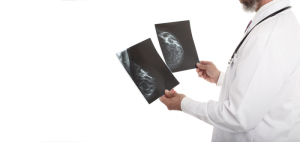by
John R. Fischer, Senior Reporter | October 15, 2018

A new deep learning approach may
differentiate false positive mammograms from
malignant and negative ones
Differentiating recalled but benign mammograms from malignant and negative ones may be less time-consuming for radiologists with a new approach that utilizes deep learning convolutional neural networking (CNN).
Researchers at the University of Pittsburgh are investigating the potential behind the AI-based method to identify false-positive mammograms from scans that are malignant or determined to be negative at the time of screening.
"A common challenge comes from tissue superimposition (overlapping) in digital mammography, which is a 2D projection imaging of 3D breast structures and tissue. The superimposition effects may reduce radiologists' confidence or certainty in recognizing a breast malignancy," Dr. Shandong Wu, an assistant professor and director of the Intelligent Computing for Clinical Imaging lab in the department of radiology at UP, told HCB News. "In addition, breast density also contributes to the difficulty of diagnosis, because both dense breast tissue and breast cancer appear "white" in the images and the cancer may go undetected when hidden by dense tissue (so-called masking effect)."



Ad Statistics
Times Displayed: 365178
Times Visited: 6995 Quality remanufactured Certified Centrifuges at Great prices! Fully warranted and backed by a company you can trust! Call or click for a free quote today! www.Centrifugestore.com 800-457-7576
Constructing CNN models and utilizing enhanced model training approaches, researchers assessed 14,860 images from 3,715 patients, evaluating them based on six classification scenarios for distinguishing images of benign, malignant and recalled-benign mammograms.
Scans were collected from two independent mammography datasets; a full-field digital mammography (FFDM) dataset of 1,303 patients; and a digital dataset of screening mammography (DDSM) for 2,412 patients. Combining FFDM and DDSM datasets, the area under the curve for distinguishing between the three ranged from 0.76 to 0.91, providing information on how many were correctly identified and how many were falsely identified.
The findings indicate that recalled-benign images possess unique aspects that can be identified by deep learning, enabling radiologists to make better decisions on whether a patient should be recalled or if the result is likely a false recall, and in the process, minimizing their workload.
"After further validation of our AI models, it may be incorporated in current breast cancer screening workflow to serve as a smart computerized assistant to augment radiologists' visual reading of screening mammogram images," said Wu. "It can help radiologists make more accurate image assessment and therefore diagnosis, thus reducing potential false recalls and as a result, reducing workload of additional imaging workup caused by the falsely recalled women."
He adds, however, that additional independent data sets are required for further evaluation of the accuracy and robustness of the algorithms, as well as alternative deep learning models, architectures and model training strategies for improved performance.
The findings were published in
Clinical Cancer Research, a journal of the American Association for Cancer Research.

